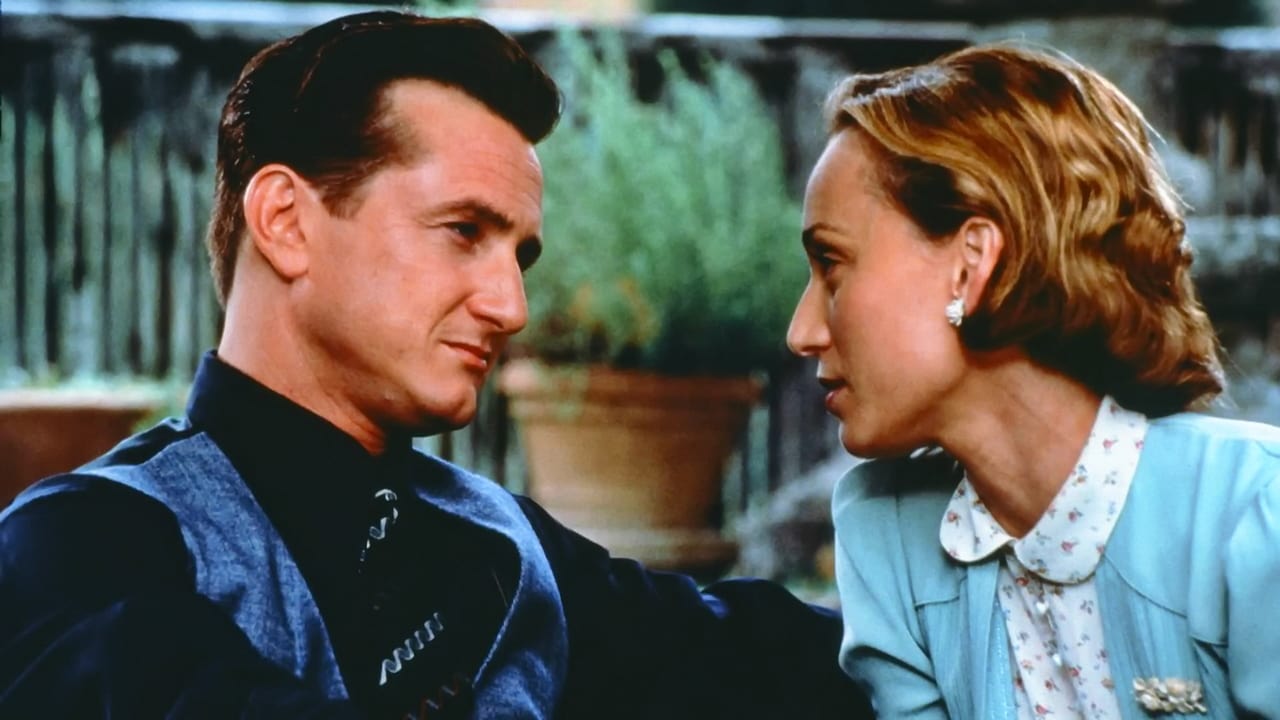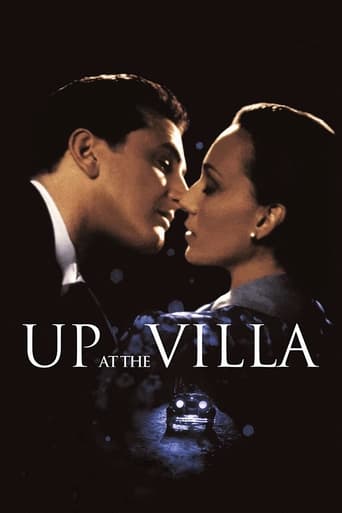



Intense, gripping, stylish and poignant
Horrible, fascist and poorly acted
Did you people see the same film I saw?
The thing I enjoyed most about the film is the fact that it doesn't shy away from being a super-sized-cliche;
View Morea beautiful film. but not convincing at whole. because something missing. but it could be only an impression. the splendid atmosphere, the acting and the emotions translation - all seems be perfect. but the story seems be without precise end or the fundamental piece who complete the puzzle.film about duty of heart, about profound honesty in dark period, with an admirable performance demonstration by Anne Bancroft and a Sean Penn in a real good role, it is the frame of Kristin Scott Thomas work who transforms her character in a sort of scent drop.a sensitive story and a good adaptation. a slice of Italy and a little part from a world. that is all.
View MoreSYNOPSIS/COMMENT: The movie aptly depicts the somewhat hum drum life of an attractive widow (Kristen Scott Thomas), who needs a protector and sponsor. An older man wants the job, he seems agreeable enough and he and the widow have a friendly history. But, it is clear that she is not attractive to him and it would be a marriage of convenience (albeit pleasantly so).The rest of the cast works in that they reflect the dullness and colorlessness of the times (in such a richly colorful place as Italy). People seeking to entertain themselves; mainly older men and women aimlessly hanging on to a foreign country the does not want them. I think that the casting was good. Ann Bancroft was wonderful and James Fox was great Thomas' older suitor. I really like the scenery and the sleepiness of the pacing which picks up after the first half of the movie.Then in the second half of the movie, in an expected turn, the widow, who seems much too naive for her age and station, is the catalyst for an event which causes the roguish character (Sean Penn) to saunters into her life. She spurned him just hours before, but, now she needs his help desperately. And, somehow, his well worn lines become appealing to her, as does he.There is the unlikely pairing of Thomas and Penn characters who are from different worlds, cultures and pedigrees. However, the young widow's choices make a lot of sense if one listens carefully to the dialogue, particularly between her the rogue. The ending is not unexpected, but, well, why don't you can judge for yourself? Check out this movie.
View MoreAs novelist, W. Somerset Maugham tends to be somewhat uninspiring; his short stories - frequently rather long - are better, and his essays run the whole gamut from the almost trivial to the almost philosophical. As a writer he is a long long way from novelists like Henry James, Joseph Conrad and Aldous Huxley: his characterization is shallow, unreal, such that wherever he sets his scenes - Pago Pago, Firenze or uptown London - one does not connect too well with the tale in question, which, often, fills one with a feeling akin to dejà vu: one has seen variations on the theme in previous writings of his. Maugham, then, is very much a one-horse matter, and in most cases, with the passing of time, his stories have become rather insipid.So has 'Up at the Villa'. Even the wonderful Anne Bancroft could do little to rescue this film from being a rather colourless account of well-to-do stiff-upper-lip British people hanging out in Florence on the eve of the Second World War. The dialogues are stiff, wooden, lending much lacklustre to the proceedings and is clearly visible in the performances offered by what, on paper, is a solid cast. But one could not really care whether Kristin Scott Thomas finally made it with Sean Penn, James Fox, or the wretched violinist Jeremy Davies. This last named started off really well, but finally sank into the abjectedness which pervades this film, especially in the second half. The result is a very quaint outdated and outmoded behavioural incursion which ends up being almost farcical, as well as overblown and tedious.No, this is not in any way comparable to 'Gosford Park' (qv) which is magnificent, again with Ms Scott Thomas, far superior with at once more depth and scintillating dialogues. Given the range of Maugham's writing, no way was this film ever to become comparable with 'Portrait of a Lady' (qv), say, 'The Hours' (qv), say, or even the powerful and majestic TV-mini 'Nostromo' (qv). However, 'Up at the Villa' does serve as a pointer inasmuch as it may show in which direction serious attempts at character-driven or dialogue-driven films may be heading, whether period pieces or not.Nice photography in the Italian countryside, and am wondering if part of the film was in fact shot further north of Florence, maybe even in the Lombardy region.
View MoreI'm intrigued by the comment below about how rich Maugham's story is - because I quite like Maugham. I also like Anne Bancroft, Kristen Scott-Thomas and James Fox, so selecting this movie from my video rental store was easy. Unfortunately, something must have happened in writing the screenplay. *** SPOILERS ***One of the more selfless and realistically portrayed acts of love I've ever seen takes place toward the end of this movie. James Fox's character reveals how very difficult and long a climb it has been to now be about to be appointed Governor of Bengal, one of the largest of India's states. With his sigh, his body movement, we sense the dedication, the diligence, the very effort it has taken to climb the "greasy pole". Fox is not a peer - we sense no great hereditary estate. He has been knighted for his painstaking work and is apparently wealthy through his very industry.Fox is promptly informed by a poor widow to whom he has proposed, that during the very weekend she was to consider his proposal: a) her view of charity was to sleep with a refugee ("I thought I'd do him good -he was just so miserable" is the amazing explanation), b) the refugee proceeded to kill himself with the gun Fox had lent her for protection, c) the widow arranged to hide the body in the woods with the assistance of a cad who despises Fox, d) Fox's gun and the cad were held by the police, but e) the widow managed to retrieve his gun and the cad by rifling through her friend's desk for material to blackmail the authorities. She tells Fox that she can understand if he would like to withdraw his proposal. Fox's reaction? Not only does he remain keen on marriage with her, but he would freely give up his career in doing so because he loves more than life, and the scandal (if revealed while he were Governor) of his wife's witless fornication causing a stranger's suicide would make the British government's task in India more difficult. To Fox's astonishing act of love, forgiveness and self-abnegation, the widow says she has never loved Fox, that his attitude is "weak" because they "need him in India" (one suspects she simply wishes to be the Governor's wife at that moment), that he misunderstands the cad who would never breathe a word of the scandal, and that she turns down his marriage proposal because the scandal has caused her somehow to become a woman of the world, rather than the child ("you're used to giving me sweets") who wanted to marry him. However, as the widow, Scott-Thomas had seemed anything but a child. She had spoken before about the horror of marriage to one without virtue - about the twelve year long marriage she had endured in which her husband had gambled and drunk away their money, whored his way through countless women, and finally been killed while speeding. She had spoken of her dread of continuing to live on the generosity of strangers. These aren't a child's sentiments but an adult's sagacity.To whom then does Scott-Thomas turn after the selflessness of Fox's love? To whom does she turn to avoid the insecurity of which she spoke as the bane of her previous marriage? To a married man who says he can offer "no guarantees" of his love or faithfulness except that he will not return to his wife, who asks her to simply take the train to "anywhere", and about whom we know only that he takes waitresses and servants frequently to bed, is disliked by the authorities, and assisted her to deceive the authorities to help her.At the end, she says to the cad, "I was yours when you first sat down". Well, welcome to misery. Sorry, I know it's the movies, but when a movie ends this badly, with the heroine choosing the charmless married void in lieu of the paragon of sacrificial love, security and virtue, I have a difficult time liking the movie. I found Sean Penn's character anything but likeable - he had a sort of neutered quality - making puerile fraternity boy jokes about sleeping with the 60+ old princess, asking "why" of a government official's decision in a crowded antechamber and shrugging weakly before sitting down (when asked if satisfied with the official's bogus explanation). I suspect the movie has taken the story's tragic ending and tried to torture it into a happy one. The same woman who presumably acted on impulse by marrying a weak man and suffered a disastrous marriage for it,the same woman who acted on impulse to seduce a poor refugee and thereby set in train the events that killed him, is indeed the woman who turns away from a man willing to throw away everything for which he worked out of love for her, for a man who says "hey, no guarantees, babe". Tragedy will undoubtedly again ensue - the little painted grin painted on the protagonist as she heads toward the bar car, can't mask it. *** SPOILERS END ***I disliked the movie.
View More